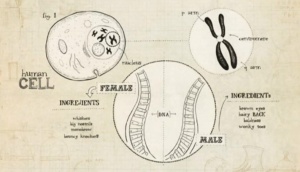Broadcaster: BBC 2
Year: 2012
Genre: Magazine show
URL: http://bobnational.net/record/298484
Review by Amy Evans
In 2012 well-known comedian (and theoretical physics graduate) Dara Ó Briain launched his eponymous Science Club. This first episode of season 1 focuses on reproduction and inheritance, including the importance of bicycles to human development. Although the show’s approach is light-hearted and humorous, there is actually a lot of information given about genetics and key speakers, such as leading geneticist Steve Jones, are involved so that the information given is up to date (at the time of showing). The show is aimed at viewers who have a relatively basic initial knowledge, but elements of it might be good to watch as a re-cap when starting new modules.
Highlights include:
A brief history of genetics (2:46, starting at 02:23, see this clip) a nice animation, summarising our understanding of inheritance from Aristotle via van Leeuwenhoek, Bakewell, Mendel and Morgan and ending with elucidation of the double helix by Watson and Crick.
Does sex work? An interview with Professor Steve Jones. Ó Briain and Jones discuss the inefficiencies of sexual reproduction, especially from the female perspective. Jones argues that invention of the bicycle is the most important step in human evolution, because it allowed intermingling of the gene pools with residents of the next village. Now, across the world, we are becoming much less isolated genetically. After a consideration of the history of the bicycle, they return to discussing the importance of genetic diversity. Generally speaking the marital distance, that is the geographical distance between the birthplace of partners relative to the distance between the birthplaces of their respective parents, gets greater generation by generation. Jones explains that genetic health may improve as we are less likely to encounter recessive mutations common within a subpopulation (for example, if you want to avoid having a child with cystic fibrosis breed with someone from Nigeria). Continue reading
